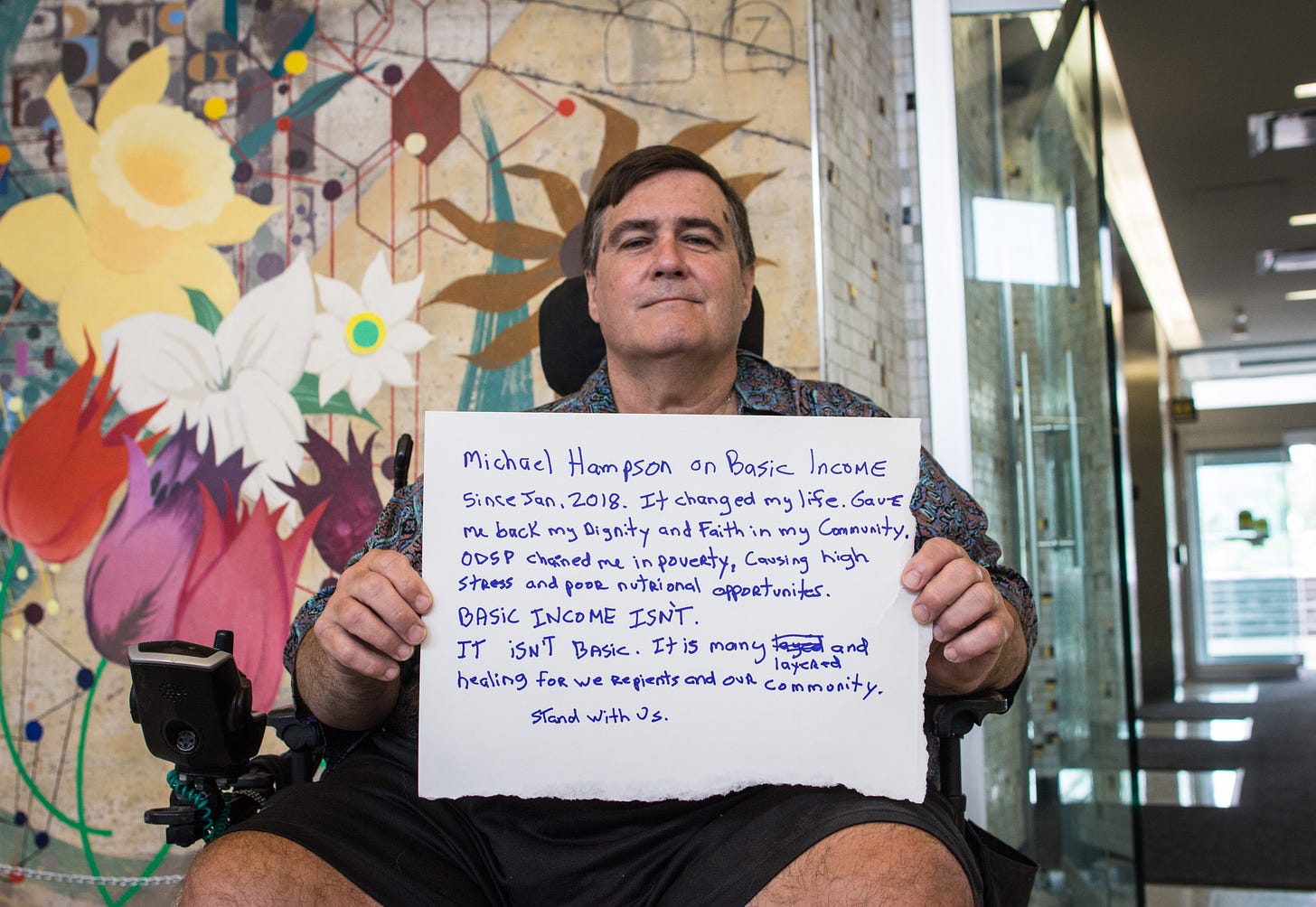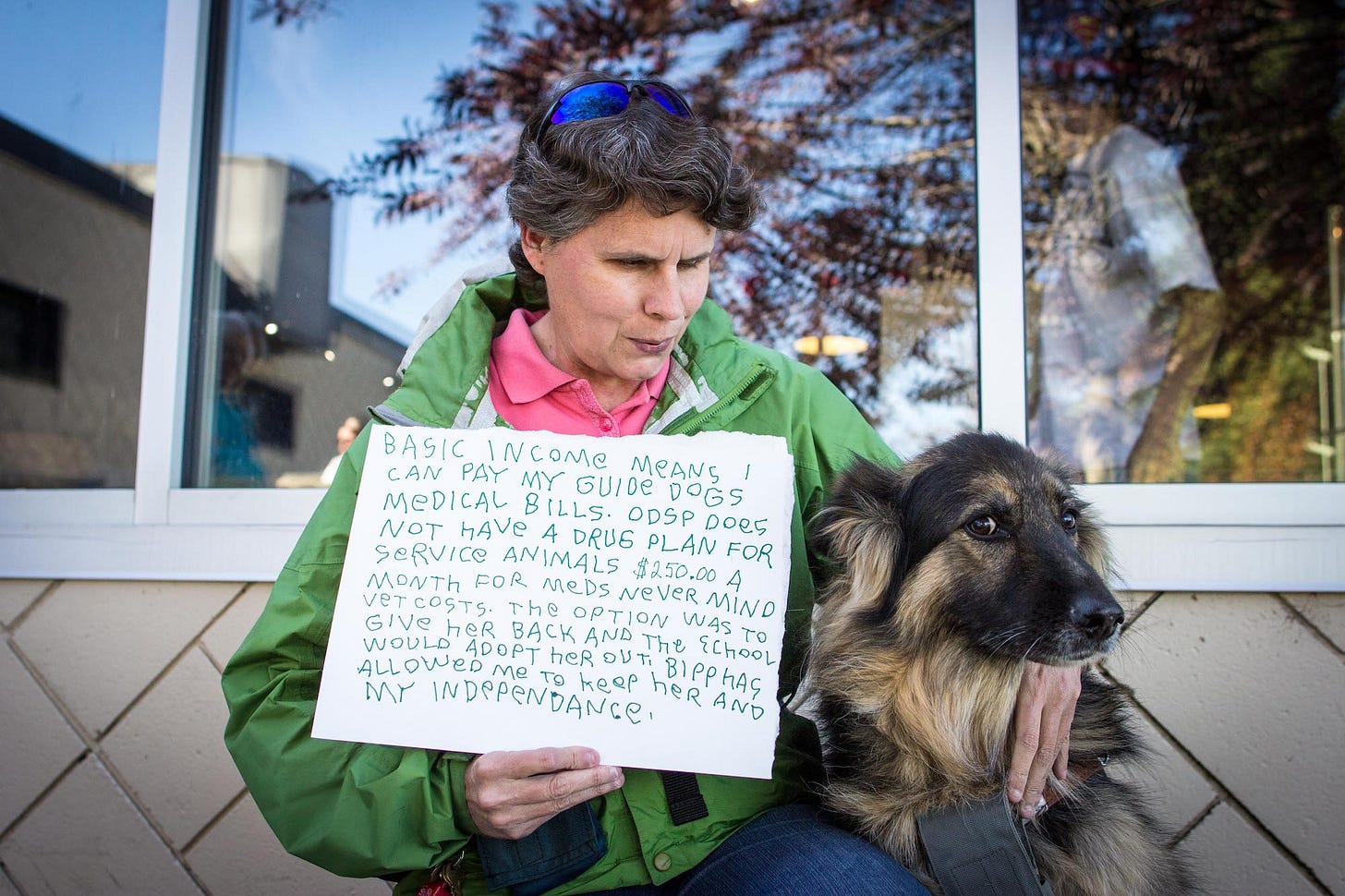It's unanimous -- Hamilton wants a basic income
Ted McMeekin hopes the current Federal government implements a Guaranteed Livable Basic Income before the next election because, "It’s time to summon the courage to do something brave and historic.”
Hamilton wants to be the best place to raise a child and age successfully. These days that’s a tall order to fulfill.
But, on June 7, 2023, Hamilton City Council took a major step towards making that vision a reality by voting unanimously to support a Guaranteed Livable Basic Income (GLBI).
The motion, put forward by Ward 15 Councillor Ted McMeekin and seconded by Ward 1 Councillor Maureen Wilson, is proof non-partisan agreement exists for a GLBI.
During the council meeting, Wilson stated that Statistics Canada found disposable income for the lowest income households increased by 36.8 per cent during the first three-quarters of 2020.
Simultaneously, the youngest households recorded a 9.8 per cent increase in their net worth.
Wilson underscored that this aberration was due to government intervention that ensured an economic floor that not only kept people afloat, but helped the lowest income households start to thrive. That intervention came in the form of the Canada Emergency Response Benefit (CERB).
Wilson, who believes this type of payment should become the norm, quoted from retired Progressive Conservative Senator Hugh Segal’s book, “Boot Straps Need Boots: One Tory’s Lonely Fight to End Poverty in Canada,’ “It [GLBI] just makes sense on every pillar – economically, socially, and otherwise.”
While a GLBI helps raise individuals and families out of poverty, the greatest benefits come from the peace of mind that it provides.
“The gap between the richest of us and the rest of us is growing,” said McMeekin in an interview with Small Change.
Citing the groundbreaking Code Red series researched and written by Hamilton Spectator reporter Steve Buist and MacMaster University’s Patrick DeLuca and Neil Johnston, McMeekin pointed out that 41 per cent of those living in poverty in Hamilton are children under the age of 14. That’s more children than a decade ago.
Social determinants of health are directly linked to income security. That’s why the poorest Hamiltonians – 21 per cent of the population -- die 23 years before the wealthiest Hamiltonians. A decade ago, the gap was 21 years.
During discussion of McMeekin’s motion, Ward 7 Councillor Esther Pauls queried, “Basic income, I understand it – helping people. But I was wondering, is this a change of language from welfare or Ontario Disability Support Program (ODSP)”
She also wanted to know if the province increased ODSP to increase the basic income because she wasn’t sure of that.
She went on to say, “When we say the [Ford] government cancelled it [the Ontario Basic Income pilot], they had the reasons maybe why they cancelled it. Maybe they gave more money for ODSP – we don’t know.”
Pauls’ queries begin at 21:44 minutes of the council meeting.
The Ontario Basic Income (OBI) pilot launched by the Wynne government was cancelled by the Ford government one month into their first term. One thousand Hamiltonians were part of the pilot along with 3,000 Lindsay and Thunder Bay residents.
The pilot was studying the effectiveness of a GLBI to raise people living on low incomes out of poverty. Individuals received up to $17,000 annually, couples up to $24,000 minus half of any income earned.
Social assistance programs include ODSP and Ontario Works (OW). Payments for OW have been frozen since 2018 at $733 per month for an individual. Over the course of a year that adds up to $8,796 but the poverty line for a single person is $19,930 annually.
For a mom with two kids, OW provides $13,497 annually which is $14,668 below that poverty line of $28,185.
ODSP recipients received a five per cent increase in the last provincial budget bringing monthly payments up to $1,228 or $14,729 a year for an individual – well below the poverty line.
A parent with two children under 18 years receives $1,989.75 monthly ODSP or $23,877 annually. That leaves the family $4,308 below the poverty line.
In an emailed statement Pauls stated in part, “Ultimately, I am in favour of providing assistance to our most vulnerable population, however, given the multiple government supports already in place, we need to make sure that the end result or impact of a Basic Income program is aligned with intent. Put another way, at the end of the day, vulnerable people in need (many below the poverty line) need assistance (regardless of which government program actually provides it and whether it is via one, two, ore [sic] more government programs). If the latter, the government programs need to be executed in tandem to ensure the intended level of benefit are [sic] achieved.”
Tom Cooper, Director of Hamilton Roundtable for Poverty Reduction, told Small Change that while the idea of a GLBI was not new, council’s unanimous decision was an opportunity to not only write to the Prime Minister and Premier, but to engage the Canadian Federation of Municipalities and the Association of Municipalities of Ontario.
Cooper recalled, “We certainly saw the impact of the pilot on local residents. Although the provincial government canned the official evaluation, we were able to work with a fantastic group of researchers at McMaster University to survey over 200 local participants.”
Cooper said almost everybody benefitted from receiving basic income payments. Participants were eating better and had stable housing. Volunteerism increased as did over all physical and mental health markers.
CERB also provided the opportunity to test a basic income-like program on a national level. It successfully kept seven to eight million Canadians from falling between the cracks during the early part of the pandemic.
Cooper says, “Basic income is going to be the most important social policy of the twenty-first century. It’s going to be to our century what Medicare was to the twentieth century. It’s just that powerful.”
Cooper sees people on social assistance falling further behind due increased housing and food costs as well as the overall effects of inflation.
“Social assistance is a broken system. It’s no longer working for the vast majority of people. It’s trapping people in poverty,” shared Cooper.
He went on to say, “It’s not allowing them to move on to get training or stabilize their lives so that they can get better jobs. Basic income can do those things. We’ve proven in Hamilton it can.”
Cooper gave every council member a copy of the book, ‘Case for Basic Income’ by Jamie Swift and Elaine Power, so those unfamiliar with the concept can read about local participants whose lives were transformed by the OBI pilot.
“There was no good reason to cancel the pilot,” Cooper asserted. “They threw the lives of pilot participants into absolute chaos and many have not recovered from that betrayal.”
While Cooper and the MacMaster team were preparing the final set of questions that would go out to OBI participants, Ford cancelled that official evaluation.
Ford also fired the ethical review board – the arms length group that’s supposed to ensure that any experiment involving humans is carried out in an ethical way.
“That spoke volumes. There was no evidence. This was purely a political decision because they didn’t like the idea of a basic income,” maintains Cooper.
“Certainly, the follow-up research we did with MacMaster University showed that basic income was having an impact on health – even things like reduction in use of alcohol and reduction in smoking. It was having impact on the way people were eating and the way people were engaging in the community. So, it’s really disappointing. But Doug Ford can’t hide that he blew it. He had an opportunity to continue a bold experiment and he was just too afraid to see the results,” Cooper added.
Another advocate who would like to see a GLBI replace the overly complicated, reactionary and punitive social assistance system is political scientist Ron Hikel. Hikel was the executive director of the original Mincome project [Basic Income pilot] in Dauphin, Manitoba from 1974 to 1978.
“Canadians have been debating about building a national basic income program on and off for over fifty years, without resolution. If this matter is to be finally settled one way or another it would help to first answer the most central question: What do we most want BI to deliver by way of its impact on behavior?” stated Hikel via email.
“The answer is for BI to reduce the negative, and intense, psychological impacts of financial insecurity. This applies to the relationships between spouses and to the environment in which children are brought up. The negative effects of insecurity have been extremely well documented and applies to both physical and mental health.”
One suggestion that has been floated is to set the GLBI at $20,000 a year for every Canadian 18-years-of-age and older. That money would be used to cover basic necessities like shelter, food and transportation.
GLBI recipients could earn an additional $20,000 annually without penalty or paying taxes on this income.
For every $3 earned after that $40,000 cut-off, $1 would be clawed back.
Once the combined total for an individual hit $80,000 annually, then the recipient would begin paying taxes.
With one-bedroom apartments renting for $1,877 and two-bedrooms for $2,300 in Hamilton (May 2023), it doesn’t seem feasible to successfully raise a child or age in place for anyone making less than $68,000 to $90,000 annually. Those numbers are based on allocating 30 per cent of an individual’s annual income to housing based on the current rental market.
The Federal Budget Office predicted the cost of a GLBI to be $51 Billion. That is far less than $82 Billion some contend was spent on CERB.
McMeekin maintains direct government involvement works and he hopes, “The current minority Federal government moves forward before the next federal election. It’s time to summon the courage to do something brave and historic.”



Yes yes yes!
I noticed in Hamilton near St. Joe’s, an apartment building of six stacked shipping containers! Hamilton is willing to experiment to find way to more affordable housing!